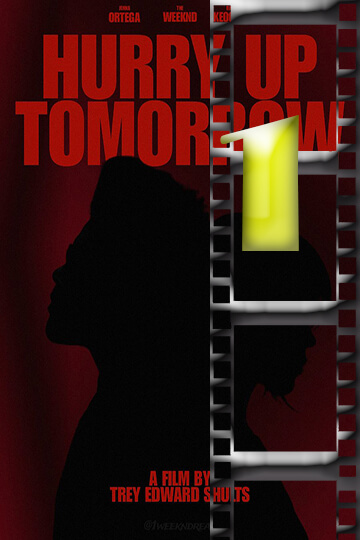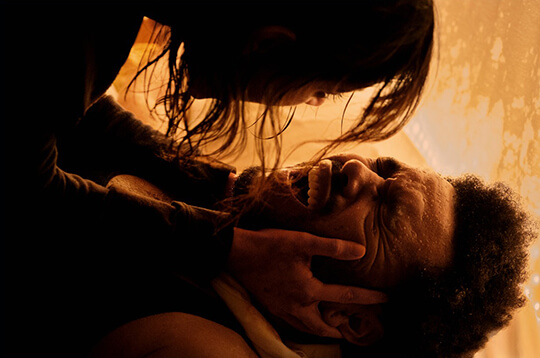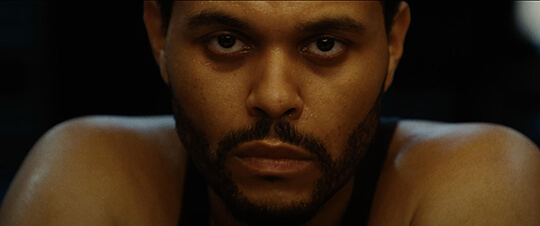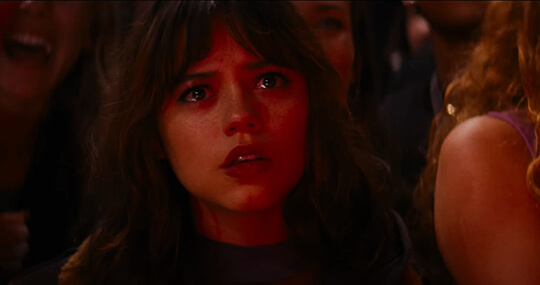
What’s It About
An insomniac musician encounters a mysterious stranger, leading to a journey that challenges everything he knows about himself.



MOVIESinMO REVIEW
I seriously cannot remember the last time that I left a theater so disappointed. “Hurry Up Tomorrow,” which was written and directed by Trey Edward Shults and stars Abel “The Weeknd” Tesfaye, had everything it needed to be something truly remarkable. What it turned out to be was the worst movie that I have seen this year. I will start with the basics. The film is about a famous singer (played by The Weeknd himself) battling insomnia, nightmares, and an identity crisis. On one crazy night, he meets Anima (Jenna Ortega), a mysterious fan who takes him on a ride aimed at confronting his darkest nightmares. What could’ve been a fascinating psychological ride quickly turns into a narcissistic mess. I was in trouble within the first ten minutes. The movie opens with a full performance of one of Tesfaye’s songs, and you are essentially subjected to a long music video. It is the tone the rest of the movie follows – a vanity project with an overemphasis on style at the expense of substance at every turn. The film’s pacing is glacial. Despite its panicked-sounding title, “Hurry Up Tomorrow” drags on and on, dragging out forever to convince you that it’s relevant. The movie tells us repeatedly throughout the movie that The Weeknd’s protagonist is troubled, addicted, and afraid of being lonely but tells us barely anything we would be interested in. It’s the same tired rock star story we’ve seen a thousand times before but toned down this time in order to protect its star’s reputation. Tesfaye’s performance doesn’t help. While he doesn’t actively ruin the film, he contributes nothing impressive to the equation. That’s especially noticeable when compared with Ortega, who, in some way, manages to give depth to her paper-thin character through raw talent. She’s the only bright spot in what otherwise is a dismal experience. The look is what initially caught my attention. Cinematographer Chayse Irvin creates some truly amazing shots with bold colors, unconventional angles, and creative lighting. But these visual flourishes quickly grow exhausting. The constant shaky cam, bad focus shots, and excessive visual illusions start to feel like having someone poking you repeatedly in the eye while screaming, “THIS IS ARTISTIC!” It’s style for style’s sake without purpose. And then there’s the plot, which is a confused mess. The audience is thrown around from scene to scene without any emotional continuity to hang on to. Dream sequences and drug-induced hallucinations blend into one another with reality, creating a disjointed experience that is more akin to channel surfing through a series of music videos than watching a coherent film. The third act is the most atrocious, where Ortega’s character delivers a lengthy monologue deconstructing The Weeknd’s lyrics. Though she does her best, the scene reeks of self-absorption. It’s really just stating, “See how deep and serious these songs are?” when actually it’s just, “A girl broke up with me, so I’m sad.” The film treats depression and mental illness as aesthetic choices rather than authentic human issues. Barry Keoghan is the artist’s manager and enabler, but like all other characters, he’s flat. Their relationship is important but discussed only in the context of surface interactions. The movie implies the star’s troubled childhood and issues with his mom but never delves deep enough into these areas for them to really ring true. The terror that finally emerges appears completely out of the blue. When the film jarringly shifts gears into psychological horror, it’s jarring in all ways conceivable. Ortega’s character changes in ways that don’t make sense based on what we do know about her (not much). The movie tries to borrow ideas from films like “Misery” but lacks the tension and character development to pull it off. There is also a discomforting subtext of misogyny all through the movie. The only female characters with actual dialogue are shown to be obsessive groupies or toxic exes. We are presented with an angry singer’s ex-girlfriend (played by Riley Keough) voicemail, repeatedly played, but the film never gives us her perspective or explanation of why the relationship ended so badly. Despite Shults’ proven abilities as a filmmaker (his previous film “It Comes at Night” actually was pretty engaging) and some occasionally impressive shots, “Hurry Up Tomorrow” falters on almost all accounts. It’s a narcissistic journey that necessitates our pity but doesn’t warrant it. I worked very hard to locate something positive here. The music composition by Tesfaye and Daniel Lopatin is pleasant, and certain of The Weeknd’s songs belong to the atmosphere of the movie. But these small positives are smothered in the ocean of pretension and self-consciousness that’s just excessive. If you’re a die-hard fan of The Weeknd, you might get something out of watching your favorite singer act in a film. Otherwise, this is an excruciating exercise in watching talented people waste their time and yours. “Hurry Up Tomorrow” is desperately trying to be great art, but it’s actually nothing more than a shallow, ego-based attempt that had me glancing at my watch, waiting for the thing to end. Skip spending your money on it and just listen to The Weeknd’s album instead – it will be a far better use of your time than sitting through this empty, infuriating movie that confuses style with substance and self-absorption with depth.
OUR RATING – A HOLLOW 1

